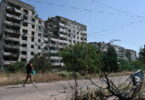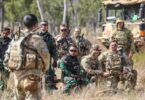Syrians in Berlin stunned by whirlwind events at home
Berlin, Germany
Video by Marion Payet
“It’s a joke what he said… I have friends everywhere in the country and everybody is happy.”
Bunni comes from Hama, the scene of a massacre perpetrated in 1982 by the army during the reign of President Bashar al-Assad’s father.

People in Damascus celebrate on December 9, 2024, after Islamist-led rebels declared that they have taken the Syrian capital in a lightning offensive, sending President Bashar al-Assad fleeing and ending five decades of Baath rule in Syria. (Photo by Bakr ALKASEM / AFP)
– ‘Joy and fear’ –
Hama was taken by the rebels on Friday, opening the road to Damascus. On Saturday, they said they had begun encircling the capital with the declared aim of toppling the Assad government.
The rebels’ lightning offensive has provoked a range of emotions for the tens of thousands of Syrians who have found refuge in Berlin since the start of the country’s civil war in 2011.
Tareq Alaows, a former law student in Damascus who arrived in Germany in 2015, described “a mixture of joy and fear”.
Alaows, 35, a spokesman for the refugee advocacy group Pro-Asyl, told AFP: “We have the right to celebrate that after 50 years the Assad regime is wavering and there may be a chance to end it.
“On the other hand, we are very afraid of what’s to come, because those currently fighting in Syria aren’t human rights organisations.”
Hayat Tahrir al-Sham (HTS), the Islamist group rooted in the Syrian branch of Al-Qaeda that is leading the offensive, is considered a “terrorist organisation” by Western governments.

– ‘Knife in the heart’ –
The HTS are “not bad people, they are children of Syria, they are saying ‘We don’t want Assad’,” said Seba, 40, who is originally from Aleppo and now runs a grocery store in Berlin.
Seba took part in the first anti-Assad demonstrations in Syria before leaving in 2011 with her five-year-old son and a daughter just a few months old.
“All these years have been like a knife in the heart for us. Now we have hope that this wound will heal,” she said.
Originally a refugee in Lebanon, Seba arrived in Berlin in 2014.
“Integration here in Germany has been very difficult. We started from scratch. My children have grown up here and my son is going to university next year,” she said.
She dreams of a trip to Syria “to see my friends”.
For Alaows, the most important task now for the Syrian community in Germany — and the country as a whole — is “to be on the side of the civilians in Syria”.
“We don’t know what it would mean if HTS came to power in Syria, what they would do then,” he added.
“But I know that this population in Syria, which has been fighting against the Assad regime for so long, will not accept oppression.”
kas-jsk-smk-fec/jj
© Agence France-Presse







